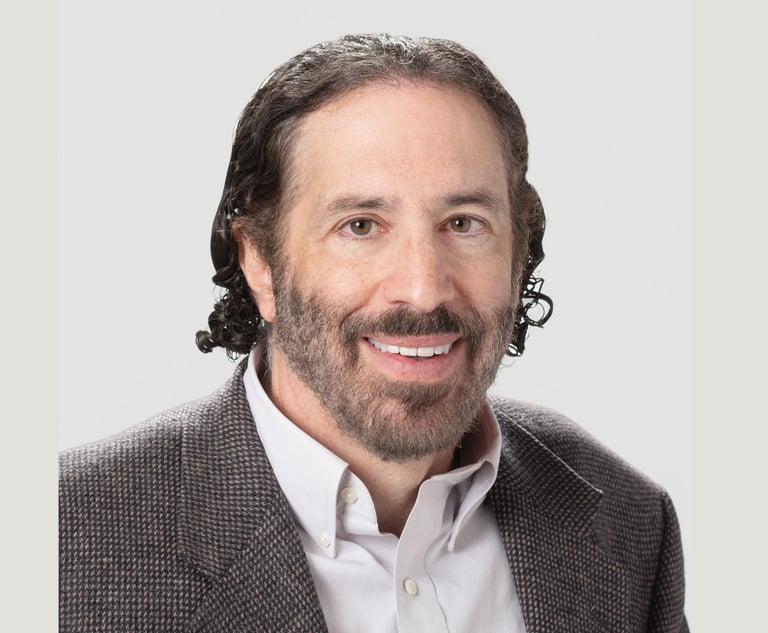Ruling That Reinsurers Can Owe Defense Costs Beyond Policy Limits Stands
The Pennsylvania Supreme Court will not disturb a first-impression ruling by the state Superior Court that, unless explicitly stated otherwise, a reinsurer's policy limit does not cap defense costs.
August 16, 2018 at 11:50 AM
4 minute read

The Pennsylvania Supreme Court will not disturb a first-impression ruling by the state Superior Court that, unless explicitly stated otherwise, a reinsurer's policy limit does not cap defense costs.
The justices denied allocatur Aug. 7 in Century Indemnity v. OneBeacon Insurance.
Last October, a three-judge panel of the Superior Court upheld a Philadelphia trial judge's ruling that OneBeacon Insurance, the reinsurer, was on the hook for defense expenses incurred by its reinsured above and beyond the limit established in the “Reinsurance Accepted” section of its facultative certificates.
Judge Paula Francisco Ott, writing for the court, agreed with the lower court that the certificates were ambiguous as to whether that section was intended to cap OneBeacon's liability for both losses and defense expenses.
The case stems from asbestos-related claims against Century Indemnity and Pacific Employers Insurance Co. (PEIC), for which OneBeacon, as those companies' reinsurer, paid $11 million pursuant to the reinsurance policy limit stated in the certificates.
OneBeacon argued that it should not be liable for defense expenses beyond that amount, but the trial court disagreed and, after a nonjury trial, awarded Century about $4.8 million plus prejudgment interest, and PEIC $2.4 million plus prejudgment interest.
Philadelphia Court of Common Pleas Administrative Judge Gary S. Glazer said OneBeacon's policy did not make clear that the “Reinsurance Accepted” amount in the certificates included defense costs.
OneBeacon argued on appeal that the terms and conditions of the certificate follow that of the underlying policy “except as otherwise specifically provided herein” and that because the language does not explicitly state otherwise, the “Reinsurance Accepted” cap must include both losses and defense expenses. The company also argued that because the “Reinsurance Accepted” is set at a specific amount, the reinsurance certificate follows the terms and conditions of the underlying policy only up to that amount.
But Francisco, joined by Judge Lillian Harris Ransom and Senior Judge James J. Fitzgerald III, agreed with Glazer, saying that, “viewing the certificate as a whole, we do not find the language unambiguously limits OneBeacon's entire liability for losses and expenses to the 'Reinsurance Accepted' amount.”
“A reasonable interpretation of the certificate's reference to OneBeacon's 'liability … specified in Section IV' is that it refers only to liability for losses,” Francisco said. “This is particularly true in light of General Condition (3), which requires the reinsurer to pay its proportion of losses, 'and in addition thereto' its proportion of expenses. Similarly, the 'except as otherwise provided herein' language is also ambiguous because the certificate does not explicitly state that expenses are included in (or 'subject to') the 'Reinsurance Accepted' limit. Pursuant to this reasoning, if the certificate follows the underlying policy, expenses must be reimbursed in addition to the policy limits.”
The Superior Court rejected OneBeacon's attempt to analogize its case with Bellefonte Reinsurance v. Aetna Casualty & Surety, a 1990 case in which the U.S. Court of Appeals for the Second Circuit rejected Aetna's argument that the “follow the fortunes” doctrine required reinsurers to pay for all of a reinsured's expenses and costs even if they exceed the “Reinsurance Accepted” amount listed on the certificate.
The Bellefonte court focused on the language in the certificates that stated Bellefonte's obligation to reinsure Aetna “subject to the terms, conditions and amount of liability set forth herein.”
But Ott said OneBeacon's reinsurance certificates stated only that the reinsurance was “subject to the general conditions set forth on the reverse side.”
“It does not expressly provide that all of the coverage is subject to the 'Reinsurance Accepted' limit,” Ott said.
Ott also noted that Century/PEIC's underlying policies provide for the payment of expenses beyond the limits.
“Therefore, because the reinsurance certificate 'follows' that of the underlying policy, it would cover expenses above the liability limit,” Ott said. “This is factually different from the situation in Bellefonte, where the defense costs were paid as part of the reinsured's settlement agreement with the underlying insured—an agreement to which the reinsurer was not a party.”
Counsel for Century, Jonathan Hacker of O'Melveny & Myers in Washington, D.C., could not be reached for comment on the Supreme Court's allocatur denial; nor could OneBeacon's attorney, Joseph Donley at Clark Hill in Philadelphia.
This content has been archived. It is available through our partners, LexisNexis® and Bloomberg Law.
To view this content, please continue to their sites.
Not a Lexis Subscriber?
Subscribe Now
Not a Bloomberg Law Subscriber?
Subscribe Now
NOT FOR REPRINT
© 2025 ALM Global, LLC, All Rights Reserved. Request academic re-use from www.copyright.com. All other uses, submit a request to [email protected]. For more information visit Asset & Logo Licensing.
You Might Like
View All
Lackawanna County Lawyer Fails to Shake Legal Mal Claims Over Sex With Client
3 minute read
Pa. Superior Court Rules Pizza Chain Liable for Franchisee Driver's Crash
4 minute read
Patent Pending ... and Pending ... and Pending? Brace Yourself for Longer Waits
3 minute read
Boosting Litigation and Employee Benefits Practices, Two Am Law 100 Firms Grow in Pittsburgh
3 minute readTrending Stories
- 1Pistachio Giant Wonderful Files Trademark Suit Against Canadian Maker of Wonderspread
- 2New York State Authorizes Stand-Alone Business Interruption Insurance Policies
- 3Buyer Beware: Continuity of Coverage in Legal Malpractice Insurance
- 4‘Listen, Listen, Listen’: Some Practice Tips From Judges in the Oakland Federal Courthouse
- 5BCLP Joins Saudi Legal Market with Plans to Open Two Offices
Who Got The Work
J. Brugh Lower of Gibbons has entered an appearance for industrial equipment supplier Devco Corporation in a pending trademark infringement lawsuit. The suit, accusing the defendant of selling knock-off Graco products, was filed Dec. 18 in New Jersey District Court by Rivkin Radler on behalf of Graco Inc. and Graco Minnesota. The case, assigned to U.S. District Judge Zahid N. Quraishi, is 3:24-cv-11294, Graco Inc. et al v. Devco Corporation.
Who Got The Work
Rebecca Maller-Stein and Kent A. Yalowitz of Arnold & Porter Kaye Scholer have entered their appearances for Hanaco Venture Capital and its executives, Lior Prosor and David Frankel, in a pending securities lawsuit. The action, filed on Dec. 24 in New York Southern District Court by Zell, Aron & Co. on behalf of Goldeneye Advisors, accuses the defendants of negligently and fraudulently managing the plaintiff's $1 million investment. The case, assigned to U.S. District Judge Vernon S. Broderick, is 1:24-cv-09918, Goldeneye Advisors, LLC v. Hanaco Venture Capital, Ltd. et al.
Who Got The Work
Attorneys from A&O Shearman has stepped in as defense counsel for Toronto-Dominion Bank and other defendants in a pending securities class action. The suit, filed Dec. 11 in New York Southern District Court by Bleichmar Fonti & Auld, accuses the defendants of concealing the bank's 'pervasive' deficiencies in regards to its compliance with the Bank Secrecy Act and the quality of its anti-money laundering controls. The case, assigned to U.S. District Judge Arun Subramanian, is 1:24-cv-09445, Gonzalez v. The Toronto-Dominion Bank et al.
Who Got The Work
Crown Castle International, a Pennsylvania company providing shared communications infrastructure, has turned to Luke D. Wolf of Gordon Rees Scully Mansukhani to fend off a pending breach-of-contract lawsuit. The court action, filed Nov. 25 in Michigan Eastern District Court by Hooper Hathaway PC on behalf of The Town Residences LLC, accuses Crown Castle of failing to transfer approximately $30,000 in utility payments from T-Mobile in breach of a roof-top lease and assignment agreement. The case, assigned to U.S. District Judge Susan K. Declercq, is 2:24-cv-13131, The Town Residences LLC v. T-Mobile US, Inc. et al.
Who Got The Work
Wilfred P. Coronato and Daniel M. Schwartz of McCarter & English have stepped in as defense counsel to Electrolux Home Products Inc. in a pending product liability lawsuit. The court action, filed Nov. 26 in New York Eastern District Court by Poulos Lopiccolo PC and Nagel Rice LLP on behalf of David Stern, alleges that the defendant's refrigerators’ drawers and shelving repeatedly break and fall apart within months after purchase. The case, assigned to U.S. District Judge Joan M. Azrack, is 2:24-cv-08204, Stern v. Electrolux Home Products, Inc.
Featured Firms
Law Offices of Gary Martin Hays & Associates, P.C.
(470) 294-1674
Law Offices of Mark E. Salomone
(857) 444-6468
Smith & Hassler
(713) 739-1250





